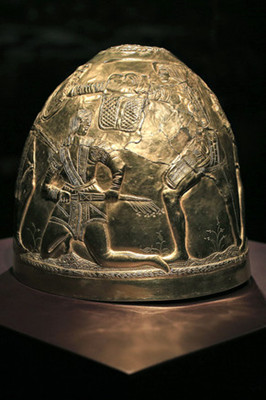烏克蘭的文化戰(zhàn)爭(zhēng)
History lessons
歷史的教訓(xùn)
The conflict in Ukraine spreads to its museums
發(fā)生在烏克蘭的沖突波及至其博物館
“HE WHO controls the past controls the future.” Orwell's dictum now faces a new test. Shortly before Russia annexed Crimea, the Bakhchisaray museum, north of Sevastopol, lent some valuable artefacts to an exhibition in the Netherlands. The question as to which country these (and other objects from Crimean museums) should return is creating a diplomatic conundrum.
“誰(shuí)控制過(guò)去誰(shuí)就控制未來(lái)。”奧威爾的這則格言現(xiàn)如今正面臨新的考驗(yàn)。在俄羅斯搶占克里米亞前不久,北塞瓦斯托波爾的巴赫奇薩賴博物館給荷蘭的一個(gè)展會(huì)出借了相當(dāng)一批珍貴的文物。問(wèn)題是,這些國(guó)家(和克里米亞博物館的其他出借對(duì)象)返還文物變成了一個(gè)外交難題。

“Let yourself be overwhelmed by the gold of Crimea,” boasts the Allard Pierson Museum in Amsterdam. Never before has Ukraine lent so many mostly Crimean treasures. The Black Sea peninsula is filled with gems left by invaders over the centuries. The exhibition includes a Scythian gold helmet from 400 BC, pottery from Greek colonisers and a lacquered Chinese box that came along the Silk Road. “We have given our very best objects,” sighs Valentina Mordvintseva, a curator at the Crimean branch of the Institute of Archaeology. She fears she may not see them again.
“都淹沒(méi)在克里米亞的黃金之下吧,”阿姆斯特丹的阿拉德皮爾遜博物館夸口。烏克蘭從未出借過(guò)如此多的寶物,并且多數(shù)是來(lái)自克里米亞。黑海半島遍地都是幾個(gè)世紀(jì)以來(lái)入侵者留下的寶物。展出的物品有公元前400年的斯基泰人的金色頭盔、希臘殖民者的陶器和通過(guò)絲綢之路傳來(lái)的漆器。“我們已給出了我們最好的物品,”Valentina Mordvintseva—這位來(lái)自考古學(xué)研究所克里米亞分所的管理者嘆息道。她擔(dān)心自己可能再也見(jiàn)不到他們了。
Who is the rightful owner? On legal grounds, Kiev has the upper hand because the Allard Pierson signed a loan agreement with the Ukrainian state. And as the Netherlands does not recognise Russia's annexation, Ukraine still owns the property. Yet the Dutch also signed contracts directly with the lending museums. And, says Inge van der Vlies, a professor at the University of Amsterdam, there is an ethical case for returning the objects to them. But there is no guarantee that Russia might not pinch the pieces the moment they arrive.
誰(shuí)才是真正的主人?法律上來(lái)說(shuō),基輔(烏克蘭共和國(guó)首都)有更具優(yōu)勢(shì),因?yàn)榘⒗缕栠d與烏克蘭簽署了貸款協(xié)議。并且荷蘭并不承認(rèn)俄羅斯的搶占,烏克蘭仍然擁有所有權(quán)。然而,荷蘭也與貸款博物館直接簽署了合同。同時(shí),阿姆斯特丹大學(xué)的Inge van der Vlies教授表示,這是一個(gè)有關(guān)歸還物品的道德案件。但也不能保證,俄羅斯在他們搶占之時(shí)不會(huì)接手這些合同。
The Dutch foreign minister, Frans Timmermans, does not wish to meddle but he also wants to avoid being seen to accept a new form of art looting. This may be impossible; whether the gold returns to Crimea or to Kiev, each side will accuse the Dutch of pilfering.
荷蘭外長(zhǎng)堤孟思并不希望插手,但他也不想他這種沉默被看做是對(duì)這種新形勢(shì)的藝術(shù)掠奪的認(rèn)可。無(wú)論金子最終歸還于克里米亞或是基輔,每一方都將指責(zé)荷蘭的偷竊行為,這或許不可能發(fā)生。
A UNESCO resolution warns of the “massive transfer of priceless cultural objects from Crimean museums to the Russian capital”. But a rogue Russia is hardly going to be deterred by reminders to stick to its obligations under international law relating to cultural property.
聯(lián)合國(guó)教科文組織(UNESCO)頒布的一項(xiàng)決議對(duì)“大規(guī)模的將物價(jià)的珍寶從克里米亞博物館轉(zhuǎn)運(yùn)至俄羅斯首都”一事提出了警告。但是這個(gè)決議幾乎不能制止一個(gè)無(wú)賴般的俄羅斯,使其在涉及文化財(cái)產(chǎn)的國(guó)際法律之下履行其義務(wù)。 譯者:張娣 校對(duì):朱大素












